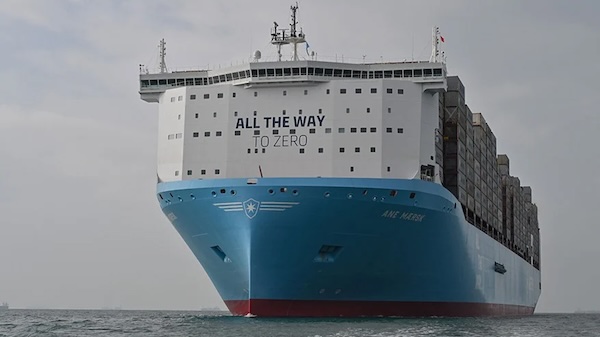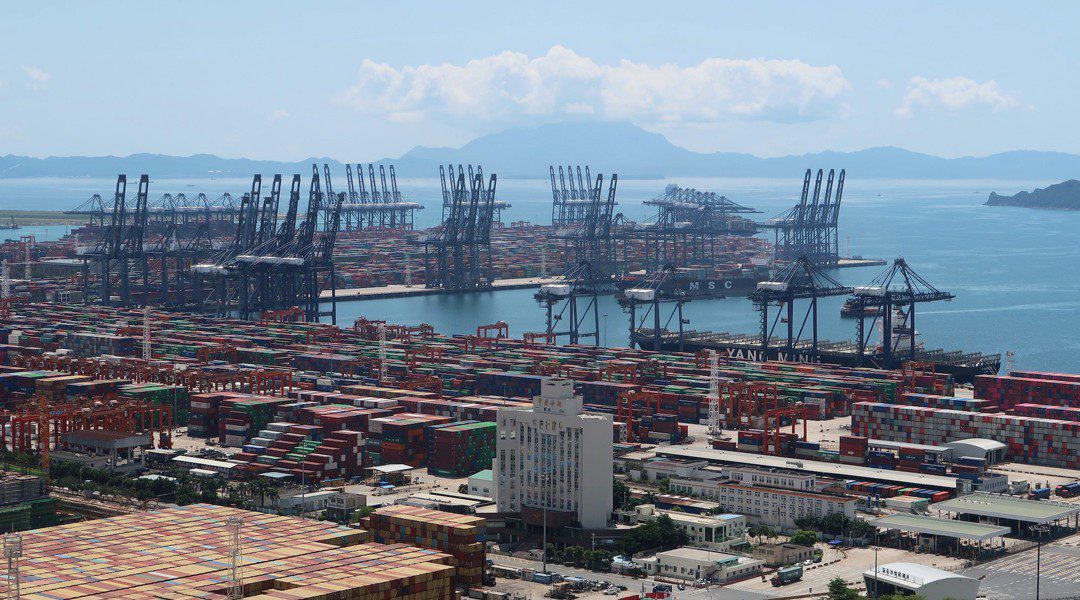Strong growth for Maersk ECO Delivery Ocean product in 2023. Over 200 customers saved more than 680,000 tons of GHG emissions. Retail, lifestyle, automotive and FMCG companies are the pioneers.
Shippers are increasingly taking action to eliminate greenhouse gas (GHG) emissions from their logistics. The latest numbers of Maersk’s ECO Delivery Ocean product are a strong proof for this trend. After 480,000 standard containers (TEU) in 2022, Maersk transported more than 660,000 TEU on green fuels* last year. 212 customers opted for ECO Delivery Ocean for their seaborne cargo in 2023 and saved over 683,000 tonnes of greenhouse gases from being emitted into the atmosphere.
Deputy CEO at Volvo Cars last July when announcing their partnership with Maersk to use ECO Delivery Ocean on large scale.
Especially for the seaborne cargo, Maersk ECO Delivery Ocean is a well-established and independently certified product to reduce the GHG emissions of an ocean transport by more than 80%.
Maja’s team developed the product together with other Maersk experts back in /18 and introduced it as from 2019. “The increasing number of these 100% commitments is an amazing trend and commitment of our customers since green fuels are significantly more expensive than fossil fuels.” Trendsetters for the 100% commitment have been global brands such as Nestlé, Inditex, Novo Nordisk (100% of their Maersk outbound logistics on ECO Delivery) or Volvo Cars (100% of their inbound logistics on ECO Delivery) as well as regional brands like the successful Danish and Norwegian retail companies Flying Tiger Copenhagen and Europris.

The success story continues with several new customers who have signed up for ECO Delivery Ocean in the new year. Among them are large retail chains like Action from the Netherlands (with 100% of their ocean volume), ICA from Sweden (with 100% of their long-haul shipments) or the chemical company Borregard from Norway with 100% of their ocean volume. Borregard is also taking the next step to piloting an e-truck solution for low emission* landside transports together with Maersk.
In a nutshell, Maersk ECO Delivery Ocean product replaces fossil fuels with green fuels such as bio diesel and green methanol. The bio diesel is solely sourced from waste streams and lead to GHG emission reductions of above 80% on a well-to-wake basis. With the deployment and naming of the world’s first methanol enabled container vessel in September 2023, Maersk introduced also green methanol as a low emission fuel in container shipping. Up to now, the green methanol’s GHG reduction lies still below the figures of bio-fuels, but with the start of the scalable production of e-methanol, the emission reductions should go up to above 90% once the processes are all optimized. These significant GHG reductions of both fuel types take even emissions into account from procuring, producing, and transporting the ingredients and the green fuels – a so-called life cycle calculation.
Kaisa Helena Tikk is heading Maersk’s Commercial Sustainability team. Her team members are experts and can act as advisors for Maersk’s customers who want to reduce the GHG emissions in their supply chains. “We see that more and more shippers engage consciously with supply chain partners who can today help realising their climate ambitions with impactful solutions. It makes us proud that we can help our customers to reduce their GHG emissions,” Kaisa shares. “A big driver is also the increased need for credible data to support science-based targets for emission reductions.”
Almost 60% of Maersk’s top 200 customers have committed to, or set science-based targets for their journey to net-zero. Maersk’s Emission Dashboard is a solution for shippers to get a comprehensive overview of the emissions across all carriers and transport modes. The consolidated data facilitates best and most impactful measures to reduce GHG emissions in a next step. Finally, the overall reporting requirements in this field are another important aspect for customers, knows Kaisa: “Nowadays, a logistics partner needs to be able to provide cargo owners with reliable and robust emission data.”
Some of Maersk’s ECO Delivery Ocean customers are shipping volumes of +50,000 containers and more per year on green fuels already. The good news: Maersk has enough green fuel available to serve all customers’ increasing ambitions to decarbonise their ocean transports.
While the ECO Delivery Ocean success continues, the teams of Maja, Kaisa and Emma as well as several other Maersk colleagues are working already on the next steps beyond low emission seaborne transports. Listening to the customers’ demand, Maersk launched an ECO Delivery Inland product in 2023 in select locations within the USA using owned and leased electric trucks. Further, Maersk began deploying heavy duty electrical trucks, together with partners, in Germany, Norway, Sweden, the UK and China, and pilots in Brazil. Maersk has also low and very low-emissions dry storage warehouses in several countries across the globe. Finally, Maersk has started piloting even an ECO Delivery Air product for airfreight with first automotive and /fashion customers.
Maersk is dependent on its suppliers’ willingness to invest in green assets, and on energy providers and energy infrastructure for green power – as in ocean transport, strong partnership is key to drive the decarbonization here as well.
Last, but not least, we need to put all the good things which are happening right now into perspective: “We have an ambitious goal to become a climate-neutral company by 2024. The 660,000 standard containers transported on green fuels in 2023 equal 3% of our global ocean transport volume and show that the low emission movement is taking large steps year-on-year. This is achieved thanks to an amazing effort together with our partners and vendors”, says Johan Sigsgaard. “We are happy to continue to serve our customers’ demand for climate-neutral ocean transport and are confident that together, we can achieve our goals”.
Source: Maersk





